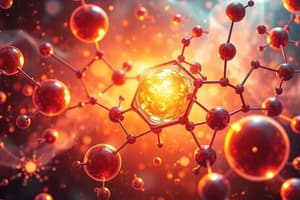Podcast
Questions and Answers
What does chemistry study?
What does chemistry study?
- Properties and behavior of matter (correct)
- Properties of electricity and magnetism
- Properties of light and sound
- Properties of living organisms
Which of the following is NOT a focus of chemistry?
Which of the following is NOT a focus of chemistry?
- Behavior of matter
- Formation of stars and galaxies (correct)
- Composition of matter
- Chemical elements
Why is chemistry sometimes called the central science?
Why is chemistry sometimes called the central science?
- It studies the behavior of living organisms
- It is the oldest scientific discipline
- It provides a foundation for understanding basic and applied scientific disciplines (correct)
- It focuses on the properties of light and sound
What does chemistry explain in the field of botany?
What does chemistry explain in the field of botany?
How are the applications of various fields of chemistry used in the chemical industry?
How are the applications of various fields of chemistry used in the chemical industry?
What does chemistry study in terms of matter?
What does chemistry study in terms of matter?
Why is chemistry considered to be an intermediate science between physics and biology?
Why is chemistry considered to be an intermediate science between physics and biology?
In what way does chemistry contribute to the field of ecology?
In what way does chemistry contribute to the field of ecology?
What aspect of chemistry is essential for understanding the formation of igneous rocks?
What aspect of chemistry is essential for understanding the formation of igneous rocks?
How does chemistry contribute to the field of forensics?
How does chemistry contribute to the field of forensics?
Flashcards are hidden until you start studying
Study Notes
What Does Chemistry Study?
- Chemistry studies the building blocks of matter, including atoms, molecules, and ions, and their interactions with each other.
- It examines the properties, composition, and reactions of matter, as well as the changes that occur when matter is subjected to different conditions.
Focus of Chemistry
- The focus of chemistry is not on the study of living organisms, which is the realm of biology.
- Instead, chemistry focuses on the underlying principles and processes that govern the behavior of matter, regardless of whether it is found in living or non-living systems.
The Central Science
- Chemistry is sometimes called the central science because it provides a bridge between physics and biology.
- It draws on the principles of physics to understand the behavior of matter at the atomic and molecular level, and it applies these principles to understand biological systems and processes.
Botany
- Chemistry explains the processes that occur within plants, such as photosynthesis, respiration, and the synthesis of organic compounds.
- It helps botanists understand how plants respond to their environment, how they grow and develop, and how they adapt to different conditions.
Chemical Industry
- The applications of various fields of chemistry, including organic, inorganic, analytical, and physical chemistry, are used in the chemical industry to develop new products and processes.
- These applications are used to design and manufacture a wide range of products, from pharmaceuticals and agrochemicals to textiles and plastics.
Matter
- Chemistry studies matter in terms of its composition, structure, and properties, as well as the changes that occur when it is subjected to different conditions, such as heat, light, or pressure.
- It examines the physical and chemical properties of matter, including its phase, density, and reactivity.
Intermediate Science
- Chemistry is considered an intermediate science between physics and biology because it draws on the principles of physics to understand the behavior of matter, and it applies these principles to understand biological systems and processes.
- It provides a bridge between the fundamental laws of physics and the complex processes that occur in living systems.
Ecology
- Chemistry contributes to the field of ecology by providing an understanding of the chemical processes that occur in the environment, including the cycles of nutrients, the formation of soil, and the movement of pollutants.
- It helps ecologists understand how living organisms interact with their environment and how human activities impact the environment.
Igneous Rocks
- The aspect of chemistry essential for understanding the formation of igneous rocks is geochemistry, which examines the chemical composition of rocks and minerals.
- Geochemistry helps geologists understand the processes that occur during the formation of rocks, including the movement of magma and the crystallization of minerals.
Forensics
- Chemistry contributes to the field of forensics by providing an understanding of the chemical processes that occur during the decomposition of evidence, including DNA analysis, toxicology, and trace evidence analysis.
- It helps forensic scientists analyze evidence and interpret the results to reconstruct crimes and identify suspects.
Studying That Suits You
Use AI to generate personalized quizzes and flashcards to suit your learning preferences.




